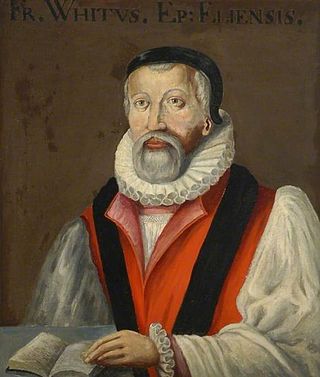Notes
- Attribution
![]() This article incorporates text from a publication now in the public domain : Cooper, Thompson (1885–1900). "Wright, Thomas (d.1624?)". Dictionary of National Biography . London: Smith, Elder & Co.
This article incorporates text from a publication now in the public domain : Cooper, Thompson (1885–1900). "Wright, Thomas (d.1624?)". Dictionary of National Biography . London: Smith, Elder & Co.
Thomas Wright (d. 1624?), was an English Roman Catholic controversialist, who was ordained priest in the reign of Queen Mary, and became one of the readers of divinity in the English College, Douai at the time of its foundation in 1569.
It is said that he had previously taught theology and Hebrew at Milan, and had also been professor of divinity both in Spain and at Louvain. He graduated D.D., and was ‘always regarded as one of the ablest divines and controvertists of his time.’
In 1577 he was working in Yorkshire, and was soon afterwards committed as a prisoner to York Castle, where he engaged in a conference with Dean Hutton and other Church of England clergy. He was ‘tossed about from prison to prison till 1585, when he was shipped off at Hull, and sent into banishment.’
He took refuge at the English College of Douay, then temporarily removed to Rheims. He was vice-president and then became Dean of Courtray. In 1622 he was at Antwerp, where Marco Antonio de Dominis, Archbishop of Spalato, repeated before him the recantation of Protestantism formerly made to the pope's nuncio at Brussels. Wright died about 1624. [1]
Wright has been very doubtfully credited with several religious tracts, which are said to have been published anonymously, but he has been confused with other writers with the same name. No list of his works can be given with confidence.
It is probable that he was author of Certaine Articles discovering the Palpable Absurdities of the Protestants Religion (Antwerp, 1600), and The Substance of the Lord's Supper (1610, 12mo). The first of these was answered by Edward Bulkeley in An Apologie for the Religion established in the Church of England. Being an Answer to a Pamphlet by T. W[right] (1602). [1]
![]() This article incorporates text from a publication now in the public domain : Cooper, Thompson (1885–1900). "Wright, Thomas (d.1624?)". Dictionary of National Biography . London: Smith, Elder & Co.
This article incorporates text from a publication now in the public domain : Cooper, Thompson (1885–1900). "Wright, Thomas (d.1624?)". Dictionary of National Biography . London: Smith, Elder & Co.
Thomas Aufield, also called Thomas Alfield, was an English Roman Catholic martyr.

Francis White was an English bishop and controversialist.
John Floyd was an English Jesuit, known as a controversialist. He is known under the pseudonyms Daniel à Jesu, Hermannus Loemelius, and George White under which he published.

Thomas Bailey or Bayly was a seventeenth-century English religious controversialist, a Royalist Church of England clergyman who converted to Catholicism.

Robert Abbot was an Anglican bishop, academic and polemical writer. He served as Master of Balliol College, Oxford, Regius Professor of Divinity, and Bishop of Salisbury from 1615. Among his four younger brothers, George became Archbishop of Canterbury and Maurice became Lord Mayor of London.
William Bishop was an English Catholic prelate who served as the first Catholic bishop in England after the Reformation, serving as Vicar Apostolic of England.

Thomas Stapleton was an English Catholic priest and controversialist.
Edward Worsley was an English Jesuit writer and professor.
Thomas Sedgwick (Segiswycke) was an English Roman Catholic theologian. An unfriendly hand in 1562 describes him as "learned but not very wise".
Edward Rishton was an English Roman Catholic priest.
Edward Coffin was an English Jesuit.

Thomas Harding was an English Roman Catholic priest and controversialist. He was one of the Worthies of Devon of the biographer John Prince (d.1723).
Henry Cole was a senior English Roman Catholic churchman and academic.
Matthew Sutcliffe was an English clergyman, academic and lawyer. He became Dean of Exeter, and wrote extensively on religious matters as a controversialist. He served as chaplain to His Majesty King James I of England. He was the founder of Chelsea College, a royal centre for the writing of theological literature that was closed at the behest of Charles I. He also played a part in the early settlement of New England as an investor.
Edward Knott, real name Matthew Wilson (1582–1656) was an English Jesuit controversialist, twice provincial of the Society of Jesus in England.
George Musket, alias Fisher was an English Roman Catholic priest and controversialist. On the English mission he was under sentence of death for around 20 years, but survived.
Sir John Boxall was an English churchman and secretary of state to Mary I of England.
Edward Weston (1566–1635) was an English Roman Catholic priest and controversialist.
Robert Wright (1556?–1624) was an English Anglican priest, a nonconformist under Elizabeth I.
Thomas Wright (1561-1624) was an English recusant and early emotion theorist. Wright is known for his work The Passions of the Minde in generall. Wright is a possible candidate for the priest Ben Jonson referenced during the trials for the Gunpowder Plot.